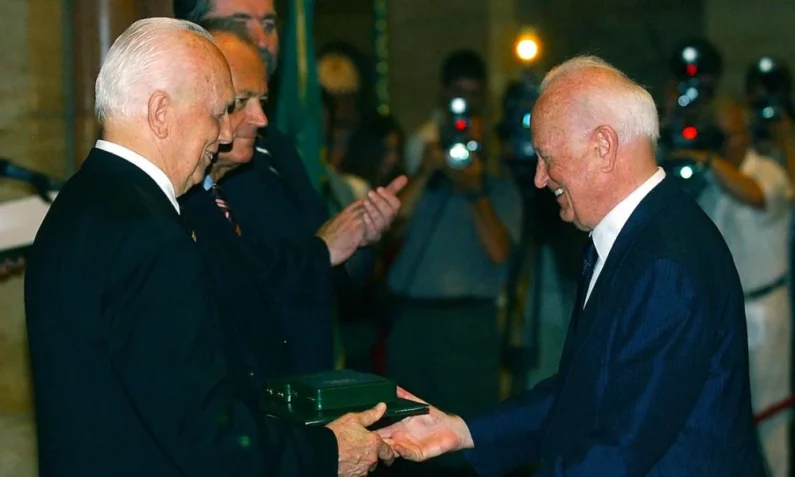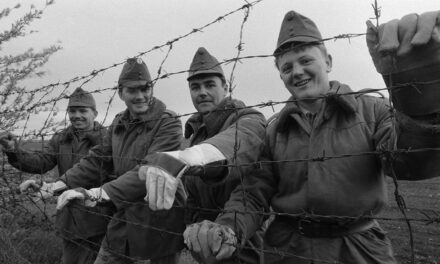The historian Zsuzsanna Borvendég's series was originally published on the PestiSrácok website, but there are certainly those who missed it. But those who haven't read all the parts should also read it again. Knowing the whole picture, can we understand how we got here?
We left off in the previous section when the bank accounts of the Western joint ventures were officially managed by the Vienna branch of the Magyar Nemzeti Bank (MNB), CW Bank, but the outsourcing mafia did everything to avoid a close relationship with the Hungarian-owned financial institution, obviously because , because they wanted to hide their activities from both the Soviets and the Hungarian state administration.
The question immediately arises, in which bank did they keep their accounts and where did they manage their finances? owned by Simon Moskovics , a banker from Hungary The financial institution was (and still is) called Winter Bank.
"As a result of the strengthening of East-West economic relations, Western financial circles are increasingly demanding the creation of financial institutions that can finance deals with socialist states more easily than before. Later this month, at the initiative of the Vienna Winter Bank, a new bank will be founded to finance East-West business, with a capital of 75 million schillings. In addition to Austrian banks, the American National Bank of Philadelphia, the French Banque of Worme and the West German Hessische Landesbank are also shareholders of the institute," Világgazdaság reported in February 1970.
From Ungvár to Vienna, to Winter Bank
Winter Bank was known as the largest privately owned Austrian financial institution, which, since the beginning of the 1950s, gained not just fame and fortune, but specialized in arranging and financing trade transactions between East and West. Simon Moskovics moved from Budapest to Vienna in 1949, in 1959 he joined the XIX. founded Winter Bank at the end of the 20th century, and using his origins in Ungvár and his knowledge of the Hungarian language, he built business relationships with the national banks of Hungary and the other countries of the Eastern Bloc, as well as foreign trade companies of the socialist countries.
In 1963, it received a license considered exceptional for financial institutions: it could import gold into Austria and, according to an agreement with the Austrian state mint, it could produce and distribute gold coins. Its business success made it Austria's largest private bank by the beginning of the seventies, but the success story did not end: in 1997, Winter Bank ranked 16th in the world's 1000 largest banks.
According to intelligence information, in the early 1980s, Moskovics was already a confidant and adviser of the Austrian finance minister, that is, he also had governmental influence. During the Cold War, Winter Bank mainly dealt with currencies and gold values from socialist countries, "the other Austrian banks also pay here the money they bought from socialist countries. The smuggled currencies are traded in extremely large amounts.” In the state security reports, we can also read that the financial institution maintained close relations with the Hungarian party and economic elite: "Hungarian traders and businessmen deposit their money in the Winter Bank in Vienna" , the institution manages their "illegal bank deposits". (His authority to issue and distribute coins may have been attractive to some groups of the Hungarian party elite from the outset, since trade in coins was not allowed in our country due to their precious metal content, but even their possession was subject to very strict regulations. György Péter's "suicide" was already discussed in this series it was discovered that collectors smuggled numismatic values primarily through Vienna. )
Internal opposition supported from Vienna?
The Viennese private bank not only sought the favor of those in power in the socialist system, but having well assessed the system's fragile state, it also prepared for its inevitable collapse in the 1980s: it provided financial support to a specific group of the emerging internal opposition.
György Dr. Bergerstein (or Bergstein) , an employee of Vienna's Winter Bank, told the news source that they wanted to send a larger sum from Vienna to László Rajk , Róbert Kertész and a certain person named Iván After that, he inquired about "reliable Jewish boys" who could be used as liaisons in dealing with the internal opposition. He also raised the names of several Hungarian citizens about whom he wanted to get a description," the state security summarized. So Moskovics already bought influence in the ranks of the emerging new political elite in the mid-1980s; he was one of the businessmen who manipulated the impending transformation from the outside. But where did he get his information, through whom did he learn about which political force to support for his own well-conceived interest?
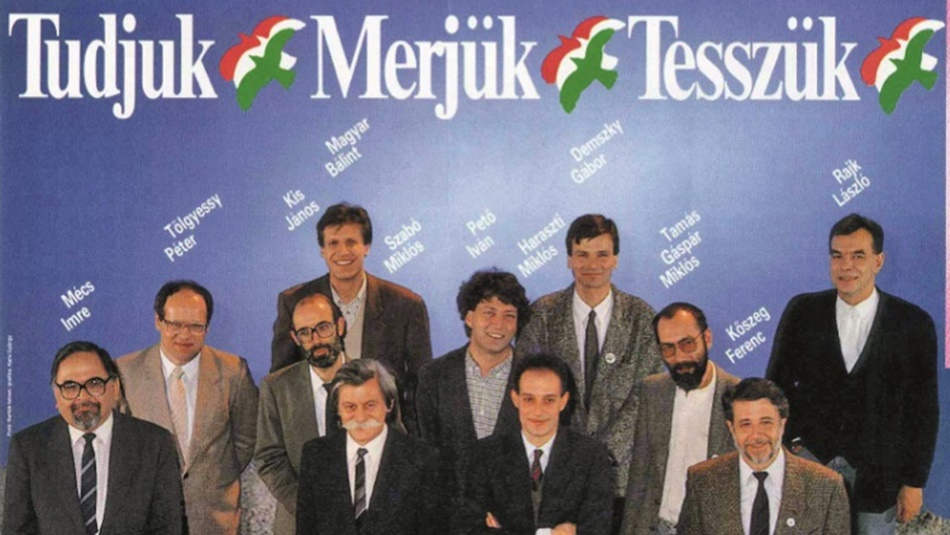
image: Facebook
The relationship between János Fekete and Moskovics
Moskovics' main confidant in Hungary János Fekete , the first deputy president of the MNB. "Moskovics has a remarkably good relationship with the former first deputy president of the MNB, János Fekete, his money in the West (or part of it) is managed by Moskovics," the BM claimed. The Viennese banker certainly provided assistance for some of János Fekete's financial manipulations.
, who was awarded the Order of Merit of the Republic of Hungary in 2006, already had a "mailbox" company in the Bahamas in 1981, according to state security, this is where he was able to launder his tax-free income from illegal sources. "Thanks" to Fekete's friendship, Moskovics took a role in many dubious deals in Hungary from the seventies; among other things , his name can also be linked to the oil deal, as a result of which the nation was damaged by hundreds of millions of dollars , and about which you can read even more later in this series.
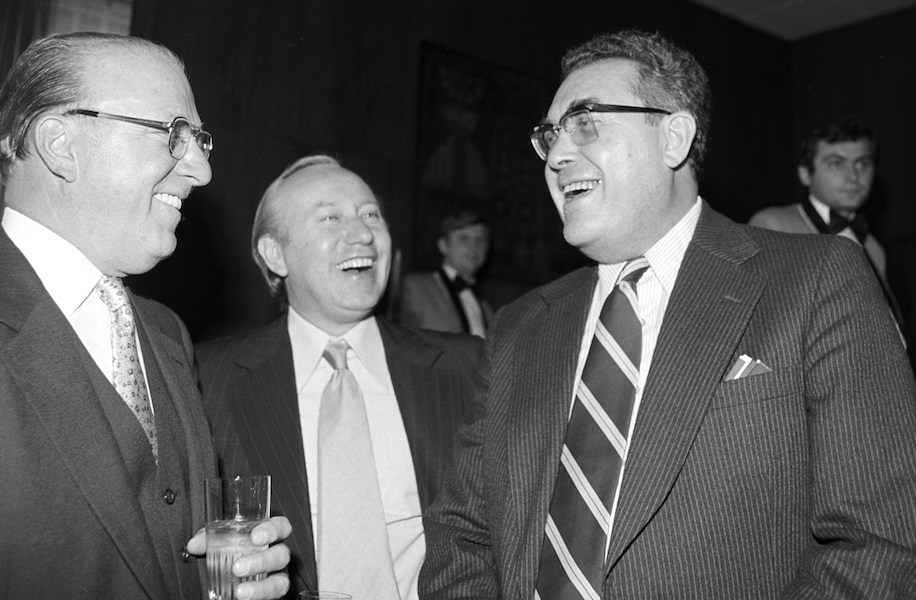
János Fekete (right) with an American business partner. Photo: MTI
The important role of the Philipp Brothers
In the Austrian capital, it was possible to outline a financial circle that could be linked to Hungary as well, which was connected primarily through János Fekete to the economic circulation of the areas closed off by the Iron Curtain. They called themselves the Public Life Committee.
Bentzur Zeew, for help so that the fifth largest banking group in the USA - Philipp Brothers - could initiate loan negotiations with competent Hungarian personalities. He named comrades János Fekete or József Marjai Munich's Jewish big capital, like Austria's, wants to get involved in developments in Hungary, primarily with capital," reads the state security report from 1985.
The Philipp Brothers (abbreviated as: Phibro) mentioned in the quote were not only known as a financial institution in the world, but they also happened to own the largest private oil refinery in the United States, which at that time had been transiting Iranian oil to America through our country for at least four years, buying it ten percent cheaper and from us, as we bought it for. They caused unfathomable damage to the Hungarian economy (perhaps even today we are still moaning about the losses they accumulated with this business), and while they pumped capital out with full steam, with their other hand they "generously" offered loans so that our country would bleed out as soon as possible. the robber structure can be maintained.
Gusztáv Sandberg and Vilmos Blaustein
But who were the two mentioned persons who directed Phibro to Black and Marjai? Moshe Sanbar - originally named: Gusztáv Sandberg - was an Israeli bank manager from Kecskemét, more precisely the governor of the Israeli central bank, who founded a bank branch in Budapest as chairman of the board of directors of Leumi Bank during the years of system change.
Bentzur Zeév , i.e. Bentzur Vilmos, left Hungary in 1948, where Vilmos Blaustein . He lived in Israel for twelve years, then settled in Vienna, where he became involved in the public activities of the Hungarian Jews living in emigration. He soon became one of the founders and a defining figure of the Vienna Jewish Public Committee, which set itself the primary goal of searching for and preserving Jewish memories and spiritual legacies in Hungary. The Public Life Committee was organized within the Vienna branch of the World Federation of Hungarian Jews (MZSVSZ), but they were in constant conflict with the parent organization operating in America. The MZSVSZ was established in the 1950s with the aim of helping the emigration of Hungarian-speaking Jews to Israel, but after immigration to Israel from Hungary almost completely stopped, the operation of the organization became formal, so - at least according to Bentzur - they looked jealously at the activities of the Public Life Committee.
However, the other party explained the differences - for which they were not even willing to receive the representatives of the Public Life Committee in New York in May 1983 - by saying that the Viennese group "misadministered" seven million dollars from the subsidies collected for cultural purposes.
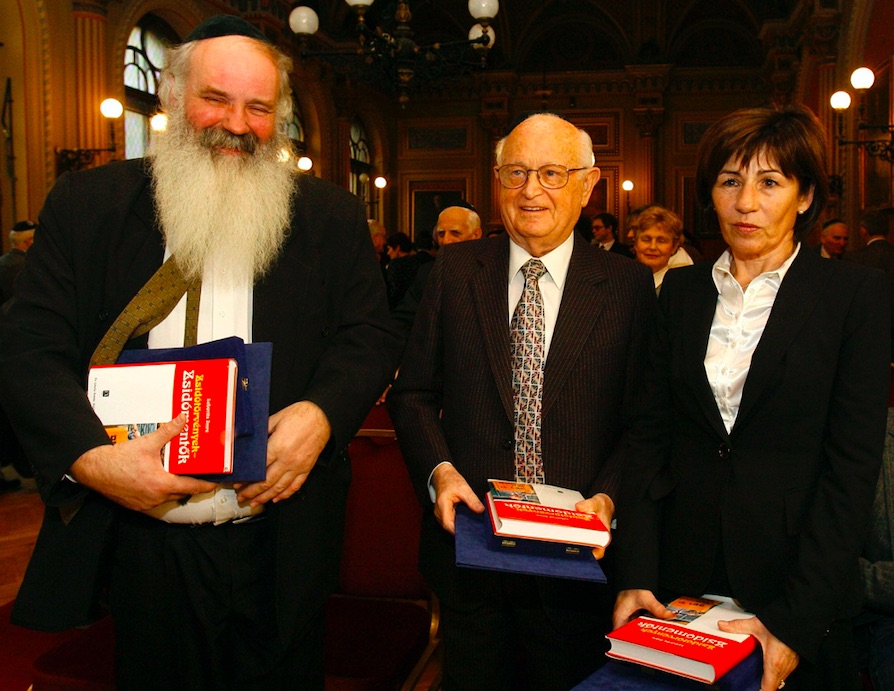
Pastor Gábor Iványi, rector of the Wesley János Pastoral Training College, Móse Sanbar, former chairman of the board of the Claims Conference, and Katalin Kerti, former chairman of the Komárom-Esztergom County Assembly, after receiving the award for Hungarian Jews in the banquet hall of the Hungarian Association of Jewish Religious Communities headquarters. (photo: MTI)
Bentzur approached his Hungarian contacts with several business offers - mainly János Fekete and István Salusinszky - and finally in 1983 he established a travel agency called OTP Penta Tours, which primarily organized visits to Hungary by Israeli tourists.
The joint venture operating in Budapest was owned 60% by OTP, and 40% by Bentzur's Austrian travel agency, Penta Tours Reisen Wien. The company was founded with a share capital of five million forints and grew into a fairly successful business: in 1985, it had a turnover of 1.4 million US dollars, and in 1986, two million US dollars. The Public Life Committee officially carried out cultural tasks, but the available data indicate that they also carried out extensive business activities. The owner of Winter Bank, Simon Moskovics, often appeared in their circle, and in fact, János Fekete's wife became a member of the five-member Hungarian management group of the Public Life Committee set up in 1985.
A network that is difficult to see through
This circle of businessmen and bankers may have been one of the western connections of the foreign-finance mafia that started the offshore pump and robbed our country. They were also active players in the domestic economic life during the years of the revolution. In 1990, for example, Winter Bank and the MNB established WIMNB Magyar-Osztrak Kereskedelmi Rt., which specialized in coin distribution. However, their most interesting and scandalous manifestation was the establishment of the Leumi Bank led by Moshe Sanbar, whose Hungarian branch was managed by none other than János Fekete.
"In December 1989, the managers of Bank Leumi Israel (BLI) had not yet decided whether they would establish a bank in Hungary independently or jointly with a Hungarian partner. But Gyula Horn's trial in Israel in January 1990 accelerated the events. The foreign minister of the Németh government at the time announced: the Israeli cabinet will create a fund to support investments in Hungary, and BLI will open a joint venture bank based in Budapest with Magyar Hitelbank Rt." - we can read in the 2004 article of Heti Válasz .
The events really had to be accelerated, as the first free election was approaching, so the Németh government agreed with one of its last decisions on the establishment of the Israeli bank, which had previously been involved in serious international scandals. From then on, dubious loan transactions and unprofitable business operations characterized the bank's activities in Hungary: "in 1993, LHB suffered a serious loss due to its too risky loan placements, but this was settled within the framework of the state bank consolidation. (In the case of LHB, the consolidation is said to have meant several billion forints.)" continues the already quoted article of Heti Válasz.
As a historian, it is not possible to unravel these threads in the absence of archival sources - this requires an investigative journalist - but we can definitely conclude that the change in the system did not break the influence of the aforementioned financial circle in Hungarian economic life.
Source: PestiSrácok
Author: historian Zsuzsanna Borvendég
(On the cover photo: Ferenc Mádl, the President of the Republic of Hungary presents Moshe Sanbar with the Middle Cross of the Hungarian Order of Merit (civil section) on the occasion of the feast of the founder of the state, King St. Stephen. Photo: MTI )

